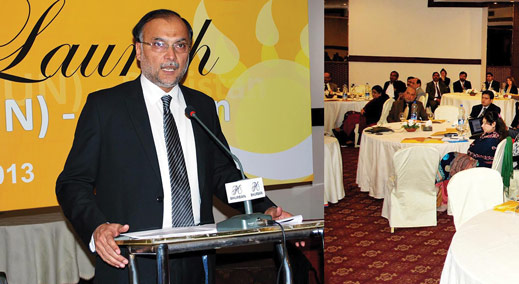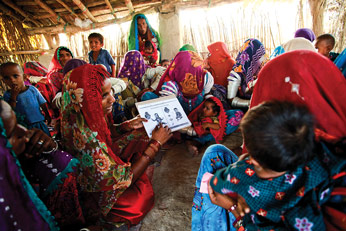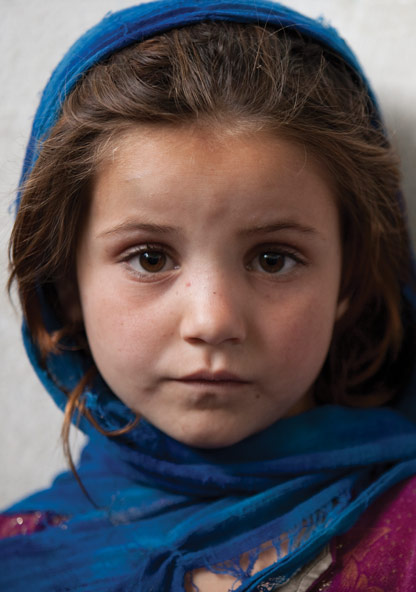Building Political Commitment for Nutrition
Pakistan was the 34th country to join the Scaling up Nutrition (SUN) Movement in April 2013. At a launching ceremony in December 2013, Ministers from the Government of Pakistan together with senior officials from federal and provincial governments and members of the Development Partners for Nutrition Group (DPNG), signed a Declaration of Commitments.
[vc_row row_type=”row” text_align=”left” css_animation=””][vc_column width=”1/2″]

Enormous advocacy efforts over the last two years have created a tremdous movement for nutrition in Pakistan.
Muhammad Aslam Shaheen, Chief of Nutrition, Planning Commission and SUN Government Focal Point
describes the growth of political commitment…[/vc_column_text][/vc_column][/vc_row][vc_row row_type=”row” text_align=”left” css_animation=””][vc_column][vc_separator type=”transparent”][/vc_column][/vc_row][vc_row row_type=”row” text_align=”left” css_animation=””][vc_column]
[vc_column_text custom_options=””]“Chronic malnutrition levels in Pakistan have not changed over the decades, and have been estimated to cost the economy 3% of the GDP each year. What needs to be done is known. Now it is time to generate political will to do it.”
Dr Parvez Iqbal Paracha,
visiting professor at the Agriculture University Peshawar’s Department of Human Nutrition
[/vc_column_text][/vc_column][/vc_row][vc_row row_type=”row” text_align=”left” css_animation=””][vc_column][vc_separator type=”transparent”][/vc_column][/vc_row][vc_row row_type=”row” text_align=”left” css_animation=””][vc_column][vc_column_text custom_options=””]Pakistan was the 34th country to join the Scaling up Nutrition (SUN) Movement in April 2013. At a launching ceremony in December 2013, Ministers from the Government of Pakistan together with senior officials from federal and provincial governments and members of the Development Partners for Nutrition Group (DPNG), signed a Declaration of Commitments. Together they committed to reducing under-nutrition levels by half by the year 2025; recognized that coordinated, multi-sectoral and consolidated efforts to scale up nutrition were required; noted that stakeholder awareness of the magnitude of the nutrition problem had to be raised; and called for political commitment, investment and support from all sectors and actors. [/vc_column_text][/vc_column][/vc_row][vc_row row_type=”row” text_align=”left” css_animation=””][vc_column][vc_separator type=”transparent”][/vc_column][/vc_row][vc_row row_type=”row” text_align=”left” css_animation=””][vc_column][vc_column_text custom_options=””]
Strategic approach
There is no formal advocacy and communication strategy for scaling up nutrition in Pakistan yet, though there are plans to develop one. Despite its recent participation in the SUN Movement, a number of diverse activities focusing on raising the profile of nutrition have been initiated largely supported by the DPNG in collaboration with the federal and provincial governments.
A SUN civil society alliance (SUN CSA) is also being established through a broad national consultation process. At a meeting in June 2014, key civil society organizations and networks from across the country met in Islamabad to form the SUN CSA for Pakistan. A membership drive to register civil society organisations will be conducted which will be followed by elections to streamline the CSA network activities for scaling up nutrition.
 [/vc_column_text][/vc_column][/vc_row][vc_row row_type=”row” text_align=”left” css_animation=””][vc_column][vc_separator type=”transparent”][/vc_column][/vc_row][vc_row row_type=”row” text_align=”left” css_animation=””][vc_column][vc_column_text custom_options=””]
[/vc_column_text][/vc_column][/vc_row][vc_row row_type=”row” text_align=”left” css_animation=””][vc_column][vc_separator type=”transparent”][/vc_column][/vc_row][vc_row row_type=”row” text_align=”left” css_animation=””][vc_column][vc_column_text custom_options=””]
Raising awareness about nutrition
A major advocacy and communication priority is to have clear communication and messages about malnutrition in Pakistan. The DPNG developed Pakistan’s Nutrition Facts or ‘Killer Facts’ which have helped to focus attention on the consequences of malnutrition including the socio economic consequences. ‘Killer Facts’ were prepared to create awareness amongst parliamentarians, civil society and others through seminars and workshops.
In addition, a series of seminars and consultations facilitated and organized by Save the Children with technical presentations by development partners and well known high profile speakers both at federal and provincial level have taken place. These focused on malnutrition and its consequences.
Senior officials have taken part in a number of key events in 2013 which have raised awareness and knowledge about nutrition in Pakistan.
There have been launches of:
- The National Nutrition Survey 2011 chaired by the Minister for Planning and Development and Reforms (Planning Commission) and co-chaired by the Minister for Health Services Coordination and Regulations with Remarks of the Resident UN Coordinator, representatives of the Provincial Governments and the DPNG
- The Lancet Series on ‘Health Systems Pakistan’
- The Lancet Series on ‘Maternal and Child Nutrition’ 2013. The launch was covered by the leading newspapers of the country
- The Institute of Development Studies Bulletin of May 2013 on ‘Addressing Malnutrition in Pakistan’
- The ‘Political Economy of Malnutrition’ by the Aga Khan University
These events are critical for highlighting to policymakers the magnitude of nutrition problems in Pakistan, the socio-economic costs and the potential for improving the nutrition agenda forward. Advocacy at national, provincial and community level has been identified as a crucial first step in transforming the enabling environment for nutrition in Pakistan.[/vc_column_text][/vc_column][/vc_row][vc_row row_type=”row” text_align=”left” css_animation=””][vc_column][vc_separator type=”transparent”][/vc_column][/vc_row][vc_row row_type=”row” text_align=”left” css_animation=””][vc_column]
The Political Economy of Under-nutrition
Engaging the media
Roundtables to engage media in highlighting the issue of malnutrition have been organized which led to several contributions by media people in leading English and Urdu newspapers. During one such roundtable organized in Karachi in November 2013, a senior journalist requested the development sector to take the initiative and start training journalists on health reporting. He said, “A journalist is just as good as his information; journalists are not experts but if given the right information, they can surely make a difference”. He noted that the media can play an effective role in raising awareness among the masses as well as advocating with government functionaries for enforcement of relevant laws and allocation of adequate resources for multi-sectoral nutrition interventions 9.

As a result training workshops have been organized for journalists followed by field visits to various health facilities in provinces. This training resulted in significantly more media coverage on malnutrition. Following the media roundtables, media representatives were provided with updated information on the situation of malnutrition for writing opinion pieces.
[/vc_column_text][/vc_column][/vc_row][vc_row row_type=”row” text_align=”left” css_animation=””][vc_column][vc_separator type=”transparent”][/vc_column][/vc_row][vc_row row_type=”row” text_align=”left” css_animation=””][vc_column][vc_column_text custom_options=””]
Working with parliamentarians across the political divide
In order to avoid nutrition becoming tied to a single party’s agenda, parliamentarians from both the ruling and opposition parties have been briefed on the situation of under nutrition at national and provincial level and the contribution of nutrition to reductions in under five mortality. After a briefing on nutrition in Lahore attended by 14 members of the Punjab Assembly, for example, parliamentarians belonging to the ruling party and opposition released a press statement pledging their support to address malnutrition in Punjab. The Punjab government is in the process of preparing an integrated provincial nutrition strategy and plans to put maximum effort into the implementation of the Punjab Protection of Breastfeeding and Child Nutrition (Amendment) Act 2012.[/vc_column_text][/vc_column][/vc_row][vc_row row_type=”row” text_align=”left” css_animation=””][vc_column][vc_separator type=”transparent”][/vc_column][/vc_row][vc_row row_type=”row” text_align=”left” css_animation=””][vc_column][vc_column_text custom_options=””]
Mobilising communities
There have been efforts to bring attention to nutrition in communities. A documentary on nutrition has been produced, which was shown on two national and 18 cable channels across Pakistan. Hosted television talk shows have been aired, with speakers from national and provincial governments, policy makers and experts. Similarly, a documentary about the situation and importance of breastfeeding has been produced and aired.[/vc_column_text][/vc_column][/vc_row][vc_row row_type=”row” text_align=”left” css_animation=””][vc_column][vc_separator type=”transparent”][/vc_column][/vc_row][vc_row row_type=”row” text_align=”left” css_animation=””][vc_column]
Advocacy to protect breastfeeding
Balochistan provinces, to implement breastfeeding legislation in Punjab and at the national level, and to finalize the Breastfeeding Bill in Khyber Pakhtunkhwa (KP).
Provincial and district strategies and communication
Two provinces, Sindh and Balochistan, have prepared nutrition programmes which have been approved and are going to start shortly. While, the provinces of the Punjab and Khyber Pakhtunkhwa (KP) have prepared integrated health sector reform project, including nutrition interventions, that have been approved and activities have started. Nutrition-sensitive approaches are being planned in all provinces.
A national communication strategy for social and behaviour change is being prepared. Similarly, the agriculture sector has developed key messages on healthy nutrition and developed pictorial communication materials for work with rural and farmers’ communities, women and men advocating for a diversification in food production and consumptions. Agriculture extensions workers and school teachers are the main messengers reaching out to the target group.
Government nutrition projects in all four provinces include a communication component involving mass media and also public sector service providers on subjects around the 1,000 days, maternal and child nutrition. The UN agencies and development partners are actively involved in advocacy and communication on both demand and supply (consumers and producers) mainly in support of universal salt iodisation (advanced) and flour fortification (in preparation). [/vc_column_text][/vc_column][/vc_row][vc_row row_type=”row” text_align=”left” css_animation=””][vc_column][vc_separator type=”transparent”][/vc_column][/vc_row][vc_row row_type=”row” text_align=”left” css_animation=””][vc_column][vc_column_text custom_options=””]
Impact
The enormous advocacy efforts over the last two years have created a tremendous movement for nutrition in Pakistan. The ‘Pakistan Vision 2025’ plan which aims to unlock the immense potential within the country through developing human and social capital, achieving good governance, institutional reform and modernisation of the public sector as well as developing a competitive knowledge economy, specifically includes nutrition. Politicians are talking about nutrition, policies and strategies are being formulated, the media are picking up on the issue of nutrition and broadcasting key messages and convening talkshows about the nutritional crisis. Provinces have nominated SUN Focal Points in their Planning and Development Departments. While there have been no scientific studies or formal evaluations conducted to measure the impact of the advocacy efforts, the impact is visible and growing. [/vc_column_text][/vc_column][/vc_row][vc_row row_type=”row” text_align=”left” css_animation=””][vc_column][vc_separator type=”transparent”][/vc_column][/vc_row][vc_row row_type=”row” text_align=”left” css_animation=””][vc_column][vc_column_text custom_options=””]
Prospects
Currently most of the communication and advocacy for scaling up nutrition is supported and led by the DPNG member organizations. The government is trying to ensure that there are financial and human resources available for nutrition communication and advocacy within national and provincial governments. Technical support to provincial governments is being extended and steps are being taken for implementation of the laws, policies and budgetary allocation for nutrition. Parliamentarians are sensitized and constantly engaged at the national and provincial level which will ultimately lead to positive results particularly in endorsing laws and policies, and increasing budgetary allocation for nutrition. Constant engagement with media will also sustain the debate and pressure. [/vc_column_text][/vc_column][/vc_row][vc_row row_type=”row” text_align=”left” css_animation=””][vc_column][vc_separator type=”transparent”][/vc_column][/vc_row][vc_row row_type=”row” text_align=”left” css_animation=””][vc_column width=”1/2″]
Key Lessons
- Coordination mechanisms are critical for planning, development and reform. Strong and adequate cooperation and coordination between government and international agencies including UN, donors and international nongovernmental organisations to overcome malnutrition has been possible through the SUN Movement platform, while a multi-sectoral strategy has been adopted. The Planning Commission has been effective in pulling together multiple stakeholders.
- Creation of nutrition awareness amongst parliamentarians and civil society is key.
 [/vc_column_text][/vc_column][/vc_row][vc_row row_type=”row” text_align=”left” css_animation=””][vc_column][vc_column_text custom_options=””]
[/vc_column_text][/vc_column][/vc_row][vc_row row_type=”row” text_align=”left” css_animation=””][vc_column][vc_column_text custom_options=””]
[/vc_column_text][/vc_column][/vc_row]